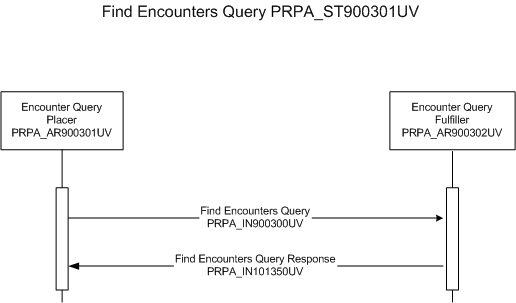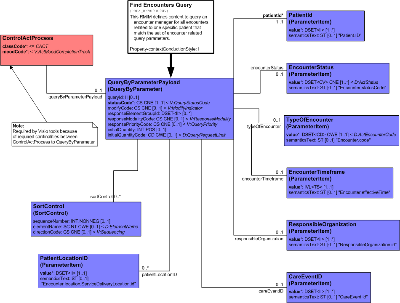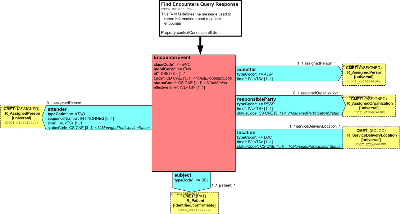 HL7 PA, R2-2010 HL7 Version 3 Standard: Patient Administration, DSTU Release 2 Update February 2010 Update to DSTU Release 2 |
Content Last Edited: 2011-06-17T13:44:56
14.2 Storyboards
14.3 Application Roles
14.4 Trigger Events
14.5 Refined Message Information Models
14.6 Hierarchical Message Descriptions
14.7 Interactions
The Encounter Queries topic defines interactions for querying a Patient Encounter Query Fulfiller application. This release defines one query-by-parameter message with seven possible parameters and one query response message that returns basic information about patient encounters that satisfy the query criteria.
The Patient Administration work group appreciates the significant contributions of Rene Spronk of Ringholm GmbH who provided the provided detailed proposals for Release 2 and Release 3 of this topic.
This topic defines only a basic mechanism for Patient Encounter queries. The work group invites implementers with additional requirements to submit content proposals for future releases of the standard.
This document was previously published as DSTU in 2007 and it is being issued as an updated DSTU again due to the lack of feedback from implementers. The Patient Administration work group wants to hear from implementers regarding the suitability for use of this content.
|
||||||
|
For details on the interpretation of this section, see the storyboard discussion in the Version 3 Guide.

| Find Encounters Query | |
| Find Encounters Query Response |
Adam Everyman (with Patient ID 8237363) makes an appointment with his new General Practicioner (GP), Dr Particia Primary. Dr Primary asks him about any hospital stays during the last 5 years. Adam Everyman recalls he had an inpatient stay at the Good Health Hospital. He doesn't recall the exact dates of the encounter. She queries the regional registry, which contains copies of relevant data from all regional hospitals, to get hold of the patient's history. She also initiates a Find Encounters Query for Mr. Everyman using his patient identifier (8237363), an indication that she's looking for "inpatient encounters", and the identifier of the Good Health Hospital.
She receives back a Find Encounters Query Response containing 1 matching encounter. An inpatient encounter took place from 20050115 up to 20050203 in the Good Health Hospital with Dr.Adrian as the attending physician. The returned information (although not clinical in nature, but administrative) provides her with contextual information for the clinical history. Dr Primary asks Adam about the details of the encounter and requests his permission to get hold of a copy of the medical records of that encounter.
Adam Everyman (with Patient ID 8237363) makes an appointment with his new General Practicioner (GP), Dr. Particia Primary. Prior to the appointment she queries the regional registry, which contains copies of relevant data from all regional hospitals, to get hold of the patient's history. She also initiates a Find Encounters Query for Mr. Everyman using his patient identifier (8237363), and a timeframe consiting of the last 5 years (date range: 20020301-20070301).
She receives back a Find Encounters Query Response containing 3 matching encounters. An outpatient encounter took place on 20040721 with Dr.Smith in the Good Health Hospital; there was an inpatient encounter which took place from 20050115 up to 20050203 with Dr.Adrian in the Good Health Hospital; and an e-mail consult on 20060823 with dentist Dr.Tootache. The returned information (although not clinical in nature, but administrative) provides her with contextual information for the clinical history. Dr Primary plans to ask Adam about the details of the second encounter.
|
||||||||
|
For details on the interpretation of this section, see the discussion of application roles and their relationships in the Version 3 Guide.
|
||||||||
|
For details on the interpretation of this section, see the discussion of trigger events in the Version 3 Guide.
|
||||||||
|
For details on the interpretation of this section, see the description of RMIMs in the Version 3 Guide.

| Parent: | Patient Administration (PRPA_DM000000UV) |
Overview
The Find Encounters Query R-MIM defines the payload for a query-by-parameter message sent to an encounter manager requesting all encounters that match the set of query parameters. The default values of the parameters are such that all active encounters are returned. The response may potentially return many records so the responseModalityCode, initalQuantity and initialQuantityCode attributes of QueryByParameter and the SortControl class are included in the information model.
Walk-through
QueryByParameter - The entry point to the R-MIM. This class allows the query requester to specify how the query should be processed by the query fulfiller. See the QUQI domain for a description.
SortControl - This class allows the query requester to specify the order in which the server should return multiple results. See the QUQI domain for a description.
ParameterList - The collection of parameter items for the query, similar to the WHERE clause in a SQL query. A query message can include any combination of the parameters. Multiple instances of parameter item are combined with AND logic. Multiple values in the value attribute of a single parameter item instance are combined with OR logic
- PatientId (mandatory): Identifies the patient that is the subject of the encounter(s)
- EncounterStatus (optional, default value "active"): Constrains the response to encounters that have one of the specified statuses, e.g. active, at any point in time within the TimeFrame (if any) as specified by the EncounterTimeframe parameter.
- TypeOfEncounter (optional): Constrains the response to encounters of one of the specified types, e.g. IMP (inpatient)
- EncounterTimeframe (optional): Constrains the responses to those encounters that had a status as contained in the EncounterStatus parameter within the timeframe as specified by this parameter. It affects encounters whose effectiveTime overlaps with any part of the timeframe specified in this parameter. Note that this parameter does NOT constrain the participations in any way, i.e. if an encounter overlaps with the timeframe specified by this parameter, ALL participations -regardless of their effectivetime- shall be returned
- CareEventId (optional): Constrains the responses to those encounters associated with the CareEvent specified by the parameter.
- ResponsibleOrganizationID (optional) Constrains the responses to those encounters where one of the organizations responsible for the encounter is equal to one of the specified IDs in this parameter.
- PatientLocationID (optional): Constrains the responses to those encounters where the patient was assigned to one of service delivery locations equal to one of the specified IDs in this parameter.
| Find Encounters Query | PRPA_HD900300UV02 |

| Parent: | Patient Administration (PRPA_DM000000UV) |
Overview
The Find Encounters Query Response R-MIM defines the payload message used for query responses that return basic information about patient encounters that satisfied the query criteria.
Walk-through
EncounterEvent a patient encounter is an interaction between a patient and care provider(s) for the purpose of providing healthcare-related services.
- (optional) id - identifers for the encounter
- (optional) code - a value further specifying the type of patient encounter. Examples include inpatient, ambulatory, emergency, home health.
- (required) statusCode - a value specifying the state of the patient encounter (based on the RIM Act class state machine). Examples include active, completed.
- (required) effectiveTime - a time interval starting with the administrative onset of the encounter (e.g., admission, registration, patient arrival) and ending with the patient's departure (e.g., discharge). Note, for active encounters the end of the effectiveTime interval, if valued, is the anticipated end date-time.
Direct Participations in the Encounter
- admitter: the healthcare practitioner that required/authorized the encounter, usually in the case of an inpatient encounter. Note: the admitter here must be the same as the author reported in the HL7 Trigger Event Control Act for the admission.
- attender: a healthcare practitioner who had responsibility for overseeing a patient's care during the patient encounter (all of them, with statusCode and time on the participation)
- responsibleParty: a healthcare provider organization that held clinical responsibility for care of the patient during the encounter (all of them, with statusCode and time on the participation)
- location: a service delivery location that was the patient's assigned location during the encounter (all of them, with statusCode and time on the participation)
- subject: the patient who is the subject of the encounter.
| Find Encounters Query Response | PRPA_HD900350UV02 |
|
||||||||
|
For details on the interpretation of this section, see the description of HMDs in the Version 3 Guide.
The Find Encounters Query payload message is used in query-by-parameter messages sent to an encounter manager.
| Find Encounters Query | PRPA_MT900300UV02 |
The Find Encounters Query Response payload message is used in response to a Find Encounters Query.
| R_PatientIdentified/confirmable | COCT_MT050002UV07 |
| R_AssignedPersonUniversal | COCT_MT090100UV01 |
| R_AssignedPersonUniversal | COCT_MT090100UV01 |
| R_AssignedOrganizationUniversal | COCT_MT090200UV01 |
| R_ServiceDeliveryLocationUniversal | COCT_MT240000UV01 |
| Find Encounters Query Response | PRPA_MT900350UV02 |
|
||||||||
|
For details on the interpretation of this section, see the definition of Interactions in the Version 3 Guide.
A user initiates a query to an encounter manager requesting all patient encounters that match a particular set of parameters.
| Trigger Event | Find Encounters Query | PRPA_TE900300UV02 |
| Transmission Wrapper | Send Message Payload | MCCI_MT000100UV01 |
| Control Act Wrapper | Query Control Act Request : Query By Parameter | QUQI_MT021001UV |
| Query Definition | Find Encounters Query | PRPA_MT900300UV02 |
| Reason | Trigger Event | Interaction |
| A Query Fulfiller application role is responsible for responding to queries | PRPA_TE900350UV02 | PRPA_IN900350UV02 |
| Sender | Encounter Query Placer | PRPA_AR900301UV02 |
| Receiver | Encounter Query Fulfiller | PRPA_AR900302UV02 |
Upon receipt of a Find Encounters Query interaction, an encounter manager returns all patient encounters that match the given set of parameters.
| Trigger Event | Find Encounters Query Response | PRPA_TE900350UV02 |
| Transmission Wrapper | Application Level Acknowledgement | MCCI_MT000300UV01 |
| Control Act Wrapper | Query Control Act Response / Acknowledgement | QUQI_MT120001UV |
| Query Response Type | Find Encounters Query Response | PRPA_MT900350UV02 |
| Query Definition | Find Encounters Query | PRPA_MT900300UV02 |
| Sender | Encounter Query Fulfiller | PRPA_AR900302UV02 |
| Receiver | Encounter Query Placer | PRPA_AR900301UV02 |
| Return to top of page |

